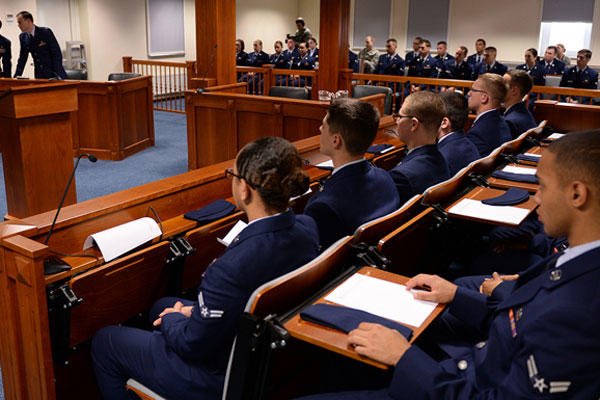SPANGDAHLEM AIR BASE, Germany -- It started off as a typical Friday night for many Airmen with their wallets full of money to burn, their stomachs ready to chug the best German beers and their minds ready to explore the undefined possibilities of "hooking up."
But for two of them, their alcohol-fueled night would end in a shattered sense of trust, establish an unclean feeling of being violated and leave them dwelling on repercussions -- both to their careers and well-being -- that would reverberate louder within their own minds than the piercing scream of an F-16 Fighting Falcon fighter aircraft.
When the matter eventually elevated to a trial several months later, the legal arguments between having the alleged perpetrator's name cleared or serving a potential life sentence in prison would hinge on one term: consent.
And the persons metaphorically holding the involved parties' lives in their hands would not be commanders or chiefs relying on decades of experience but junior enlisted who had just set their boots on base days earlier.
The 52nd Fighter Wing Judge Advocate, with the support of the Sexual Assault Response Coordinator and Base Chapel, conducted "Got Consent?," a new training simulated trial involving sexual assault, for more than 30 first-term Airmen at the base legal office Oct. 24.
The offices banded together for the interactive project - appointing junior enlisted as jury members for one of their peers - as part of First Term Airman Center's new curriculum to educate Airmen about the dangers of sexual assault as well as the murky complexities behind weighing each specific case.
"Our whole purpose is to contribute to fostering a culture of respect for other Airmen and to take care of their wingmen," said Capt. Samuel Welch, 52nd Fighter Wing Judge Advocate chief of military justice from Fort Worth, Texas. "This is a way from the beginning of their career - the beginning of the time that they show up at the installation - to get them thinking about this so if they see something going on with a friend that shouldn't be going on that they know it and have the courage to step in and stop it."
"Got Consent?" places its spotlight on the term itself, defined by the Air Force Sexual Assault Prevent and Response Program website as "words or overt acts indicating a freely given agreement to the sexual conduct at issue by a competent person."
Additionally, the term "competent" included "there is no consent where the person is sleeping or incapacitated, such as due to age, alcohol or drugs, or mental incapacity;" and within that last clarification, the debate behind this particular case rested.
In the program, Airmen participate in an abbreviated court-martial process, including an opportunity to weigh arguments centered on that very term of "consent," in an environment similar to legal dramas they may see on television and in ones the legal office's mission is to facilitate.
But Welch said the intent of the program is to serve as more than just a teaching tool.
"It is hopefully a deterrent tool - something for them to keep in the back of their minds as they go out and do things they can do like have fun with their friends, but to know where that line is and take care of their wingmen," he said.
Hours before entering the courtroom for the trial, Airmen heard from SARC representatives about the different types of reporting and support structure that exists for victims. The chapel also provided a briefing on the different ways men and women communicate, underlining how misunderstandings between people may lead to unintended consequences.
Later, the Airmen, donning service dress, packed the gallery in the courtroom while the first dozen filled the seats reserved for the jury.
After standing for the arrival of the judge, here played by Staff Sgt. Debraca Williams, 52nd Fighter Wing Judge Advocate civil law paralegal from Lawton, Okla., the Airmen watched as the prosecution and defense counsel presented their arguments over the case, based on an actual case.
In the interest of conserving manpower while maintaining the proceeding's judicial ambiance, the legal staff ran a video dramatization of a female Airman, role-playing as the victim, being cross-examined by both sides all while in front of the alleged perpetrator.
Some attendees displayed visual discomfort as the victim recollected the events of the night in question in unfiltered realism, using words like "ejaculation" and describing how unclean she felt even after showering.
To counter, the defense pressed the victim on the circumstances leading up to and after the event. The excessive consumption of alcohol and any undefined shades between a romantic relationship and being "just friends" generated quiet discussion among the spectators.
As the sides moved to their closing arguments, the prosecution aimed to refocus the discussion away from any distractions and back to the alleged crime at hand.
"This case is not about the victim -- this case is about the accused," said Welch, who assumed the role of the prosecution, in his closing argument. "The accused is on trial for what he did that night, and don't forget that."
Fulfilling its role, the defense counsel reminded the jury on the implications behind the terms "burden of proof" and "beyond a reasonable doubt."
"Neither you or I were a pillow case or sheets that night," said Staff Sgt. Gregory Norris, 52nd FW paralegal from Sarasota, Fla., role-playing for the defense. "But you will have to decide what did or did not happen in that dorm room those early morning hours. We can all agree she does not know what happened. So I ask you, are you firmly convinced beyond a reasonable doubt that you know right here and right now what did happen in that dorm room? If the answer is no, then the accused is not guilty."
The judge then instructed the jury on its duties as well as blunt summation of the central crime - that the defendant allegedly inserted his penis into the victim's vagina -- as well as a nearly 10-minute explanation of terms.
With each minute that passed, the jury's collective attention grew while assuming the decision they would soon be issuing. As the 12 panelists debated, the legal teams asked the Airmen watching in the gallery to also talk among themselves about reviewing the multitude of human complexities and reach a conclusion.
"It's not a simple case," Welch said. "There's more value in having them deliberate through this process and really think about it."
As court returned in session, the jury presented its verdict before learning how their decision compared to what actually took place in the courtroom before.
Regardless of the original outcome or this class' verdict, Welch made a point of asking Airmen not only to think of the juror's process but about how they could respect others, take a stand and intervene.
"Hopefully this will help them to have the courage to stop someone else or to make those affirmative decisions for themselves so they don't ever end up sitting here," Welch said.
Airman 1st Class John Forehand, a 52nd Equipment Maintenance Squadron aerospace ground equipment mechanic from Statesville, N.C., arrived at Spangdahlem just six weeks prior to serving as one of the 12 jurors. Of all the "Got Consent?' features, he said he most appreciated receiving education through a different medium.
"It's a very realistic scenario," he said. "All through our training up until this point, we've done briefing after briefing after briefing all day long. It gets us out of the briefing environment. We're not just looking at a projector and slides and PowerPoint. It gets your mind flowing a little, but it's more than watching a video itself or reading about it in a slideshow. It gets you into it and actually thinking about it."
One of Forehand's fellow FTAC Airmen, Airman 1st Class Juanita Baker, 606th Air Control Squadron ground radar apprentice from Damiansville, Ill., also arrived at Spangdahlem in early September. Although not part of the jury, Baker discussed the merits of the case with fellow spectators in the gallery.
"I feel it's very important that you get involved because if you don't, you may end up being one of the people sitting here in this courtroom," Baker said. "It really got everybody talking about sexual assault and what could happen to lead to sexual assault and what the after effects of it are and just to make us more aware of all the consequences and everything involved."
Baker, who lives in the dorms, said the conversations her fellow Airmen discuss, however harmless, are often devoid of confronting the enabling conditions in which sexual assault may occur.
"Most of the time, all I hear people talking about is 'Oh, let's go drinking this weekend,'" she said. "They never talk about what the consequences of drinking will be."
With the court proceedings over, Baker said she intends to take "Got Consent?" and its message to heart -- both as a caution and a comfort -- as she or her fellow Airmen head out for a night's entertainment some weekend.
"It is really eye-opening," she said. "Before I got into the Air Force, I never even thought about it. Now that I'm here, I'm so happy the Air Force has taken a stand on this."



























